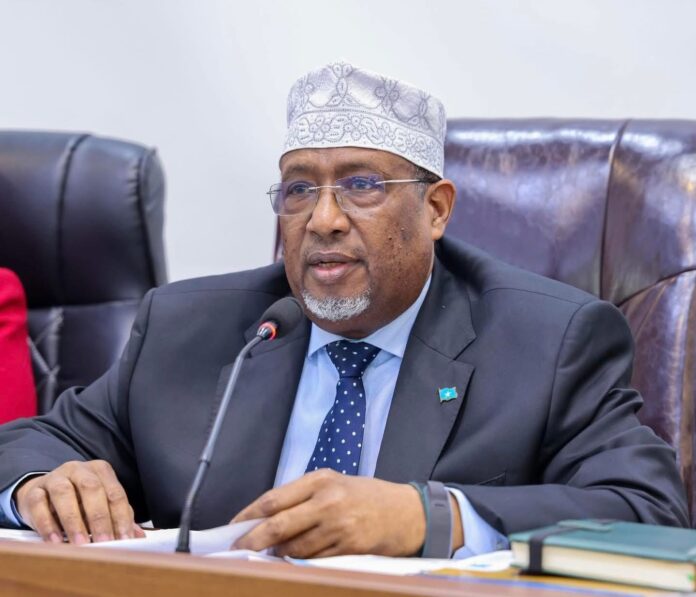MOGADISHU (Kaab TV) – Somalia’s federal parliament has plunged into a deep political crisis after a motion to impeach Lower House Speaker Aden Mohamed Nur “Madobe” sparked chaos and physical confrontations during Wednesday’s session.
Lawmakers clashed inside the chambers after Speaker Madobe and his deputies allegedly refused to table the impeachment motion for debate.
As the session was due to start, a heated session descended into violence, leaving several opposition MPs bruised and journalists physically assaulted and later removed.
It was the second time in two weeks that a parliamentary session ended in disorder, leading to yet another abrupt adjournment.
Controversial order banning 20 opposition
In response to the unrest, Speaker Madobe issued a controversial order banning 20 opposition MPs and three pro-government lawmakers from attending future sessions, accusing them of inciting the chaos.
“I instruct the parliamentary secretary-general to begin enforcing this order against those who caused disruption in the House,” he declared.
BREAKING: Speaker of Parliament,’s Lower House Sheikh Aden Madobe has just announced that he stopped pursuing his illegal expulsion of MP @MPDrAbib from the Somalia Federal Parliament.
“I have decided to return the issue to the Parliament’s ethics committee to decide on the next… pic.twitter.com/dkFaZM0PR7
— Kaab TV (@KaabTV) April 29, 2025
The turmoil traces back to Madobe’s earlier decision to expel outspoken opposition MP Abdullahi Hashi Abib, a diaspora-based lawmaker critical of President Hassan Sheikh Mohamud.
Abib has frequently raised concerns about government corruption, particularly related to contracts and donor funds.
However, on Tuesday, the Speaker rescinded the expulsion, referring the matter to the parliamentary ethics subcommittee.
Despite this reversal, opposition MPs pushed forward with their impeachment efforts.
MP Abdirashid Hiddig said they intended to present the motion on Wednesday and expected Madobe to step aside from chairing the session in accordance with parliamentary procedures.
“Once the Speaker is under impeachment, he must step down from his role during the session, and one of his deputies should preside over the meeting,” Hiddig stated.
Neither of the Speaker’s deputies attended, and Madobe attempted to continue chairing the session himself.
As tempers flared, Madobe reportedly hurled insults at vocal MPs, including using derogatory language against a lawmaker living with a physical disability.
The remarks provoked outrage within the parliament and across Somali civil society.
“This Speaker has violated the dignity of MPs with disabilities. This is a human rights violation,” said MP Hiddig. “The world needs to know he cannot lead the Somali parliament with such conduct.”
The National Coalition for Disability Rights condemned Madobe’s comments, urging him to issue a public apology and uphold respectful discourse in the House.
“Disability should never be used to silence, discredit, or diminish anyone’s participation,” the coalition said in a statement. “Such language undermines dignity, equality, and inclusive democratic values.”
Several political figures, including former President Sharif Sheikh Ahmed, former Prime Minister Hassan Ali Khaire, and MP Abdirahman Abdishakur, have also denounced the Speaker’s behavior and called for calm and accountability.
The ongoing crisis threatens to derail critical legislative functions and deepen political instability in Somalia, as lawmakers remain divided and public confidence in the parliament wanes.


